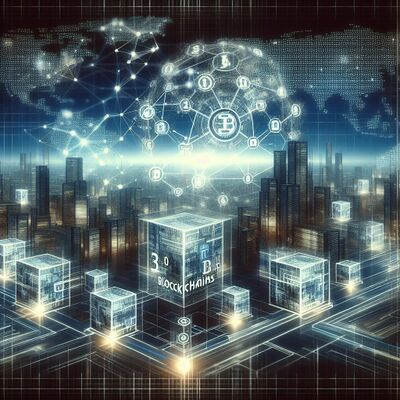Blockchain: Difference between revisions
| [checked revision] | [checked revision] |
CryptoUser (talk | contribs) No edit summary Tag: Reverted |
CryptoUser (talk | contribs) (Undo revision 2140 by CryptoUser (talk)) Tag: Undo |
||
| Line 5: | Line 5: | ||
|description= What is the Blockchain and How does it work | |description= What is the Blockchain and How does it work | ||
}} | }} | ||
[[File: | [[File:Blockchain 2024-01-24 13-07-32.jpg|400px|thumb|right]] | ||
'''Blockchain''' is a [[decentralization|decentralized technology]] that provides a secure and transparent process for recording and storing information on the Internet. The technology is based on [[block]] chains that contain [[data]] and are stored in a distributed network of computers called [[node]]s. Each block contains a set of records about [[token]]s or [[transaction]]s that are added to the chain sequentially and cannot be changed or deleted without the consent of the majority of network participants. | '''Blockchain''' is a [[decentralization|decentralized technology]] that provides a secure and transparent process for recording and storing information on the Internet. The technology is based on [[block]] chains that contain [[data]] and are stored in a distributed network of computers called [[node]]s. Each block contains a set of records about [[token]]s or [[transaction]]s that are added to the chain sequentially and cannot be changed or deleted without the consent of the majority of network participants. | ||
Revision as of 12:29, 24 January 2024

Blockchain is a decentralized technology that provides a secure and transparent process for recording and storing information on the Internet. The technology is based on block chains that contain data and are stored in a distributed network of computers called nodes. Each block contains a set of records about tokens or transactions that are added to the chain sequentially and cannot be changed or deleted without the consent of the majority of network participants.
A promising concept of the Internet of the future, Web 3.0, is being implemented on the basis of blockchains.
Characteristics of the blockchain
The main characteristics of the blockchain are transparency, security and decentralization.
- Transparency means that all network participants can see all transactions and records in the blockchain.
- Data security is ensured by the cryptography mechanism. The information in the blocks cannot be changed or forged unnoticed by network participants, and a number of mechanisms ensure the recovery of corrupted records.
- Decentralization means that the blockchain works without central management and control, each node has equal rights and participates in the process of confirming and recording new blocks.
Examples of blockchains
One of the most well-known blockchain implementations is the Bitcoin cryptocurrency. The Bitcoin blockchain is used to record and confirm all transactions of this cryptocurrency.
The development of the Bitcoin idea was Ethereum, a decentralized platform based on blockchain technology that allows you to create and run smart contracts, as well as develop and distribute decentralized applications (dApps). The main difference between Ethereum and Bitcoin is that Ethereum is not only a digital currency, but also provides opportunities for developing and working with smart contracts and decentralized applications.
DecimalChain is a new stage in the development of the idea of blockchain. It differs from Ethereum in that it does not require specific knowledge and professional skills to work with smart contracts, dApps and cryptocurrencies. Being a kind of "constructor", DecimalChain provides ordinary users who are not too deeply familiar with the cryptosphere with the tools to create all this in the Cosmos ecosystem.
Blockchain has a wide range of applications and can be used in various fields such as finance, supply chain, healthcare and public administration. Due to its characteristics, blockchain can increase efficiency, improve the security and stability of systems, as well as eliminate the need for trust in centralized instances.